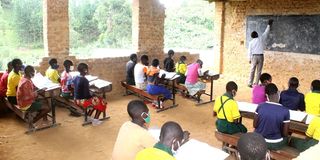Prime
Court orders teaching of sexuality education

Pupils attend a class session at Nyakitokoli Primary School in Karagura Sub-county, Kabarole District, in 2018. Photo/ALEX ASHABA
What you need to know:
The ruling means the use of the word “comprehensive” in sexuality education matters is now legal.
The High Court in Kampala has directed the Education ministry to quickly develop and implement the comprehensive sexuality education policy for school learners, ending a 10-year wait.
Justice Lydia Mugambe in her ruling delivered earlier this week held that under the international laws, adolescents both girls and boys, should be provided with and not denied accurate and appropriate information on how to protect their health and development and practice healthy behaviours.
She added that Uganda is party to international conventions, which unequivocally require government to enact a policy that comprehensively provides sexuality education.
“Based on the above, I find no justification and the inordinate delay or omission of over 10 years to develop a comprehensive sexuality education policy in Uganda is a violation of Uganda’s obligations under international law and the constitution,” Justice Mugambe ruled.
“Accordingly, the ministry is directed to develop a comprehensive sexuality education policy. In so doing, it must identify and work with the breadth of relevant stakeholders and address all issues competently,” she added.
The judge further directed that the policy must be completed within two years, with the ministry reporting on the progress to the registrar of the court every six months.
Filed by a civil society organisation, Centre for Health, Human Rights and Development (CEHURD) in 2016, the case was premised on a resolution issued by Parliament in August 2016, directing the Education ministry to ban the teaching of sexuality education in schools.
CEHURD had objected to the delay by the ministry to issue comprehensive sexuality education policy and the ban by Parliament without alternatives for the same.
The Ministry of Gender had prior to banning the teaching of sexuality education in schools, allegedly stumbled on sexual reproductive health books in more than 100 schools that included sexual orientation.
The ban in effect, halted the dissemination of all sexuality education, leaving the young learners prey to unwanted pregnancies and sexually transmitted diseases due to lack of information.
The teaching of sexuality education, had for the past over two decades been a controversial subject of whether it should be taught in schools or not.
Majority of the religious leaders had vehemently rejected the policy.
Mr Ismael Mulindwa, an official of the Education ministry, had told court that the ministry recognises “sexuality education” but not “comprehensive sexuality education.”
He had further told court that the ministry had banned all unaccepted programmers and materials on comprehensive sexuality education for a good reason, considering the issues surrounding it and the content taught had raised concerns of liberalisation of sex, among children and promotion of illicit sexual conduct such as homosexuality and masturbation.
The use of the word “comprehensive” in sexuality education matters had been rejected by the Ministry of Education officials.
But in her ruling, Justice Mugambe held that the inclusion or exclusion of the word “comprehensive” in sexuality education is a simple matter of form that should never derail the substance of this process.




